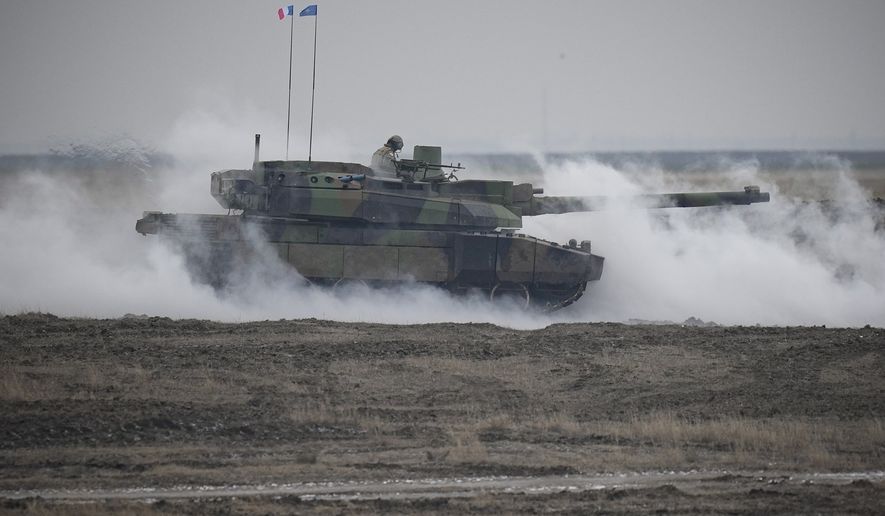Russia’s 2022 invasion of Ukraine threw a spotlight on religious liberty around the world, shifting the discussion from abstract arguments to the front lines of a war that has lasted 11 months with no end in sight, said a co-chairman of this week’s International Religious Freedom Summit in Washington.
“I think people ignored [Russian President Vladimir] Putin’s dedication to the Russian Orthodox Church previously,” said Sam Brownback, a former ambassador for the State Department’s office of international religious freedom. “Now, they recognize this as a major factor in his wanting to strengthen the Russian world as they describe it. When the Ukrainians split off their Orthodox Church, this was a really big issue for Putin and Russia.”
Global rights concerns will be at the center of the summit on Tuesday and Wednesday. Featured speakers include former NBA athlete and human rights activist Enes Kanter Freedom, actor Penn Badgley, U.S. Agency for International Development Administrator Samantha Power and Rashad Hussein, who succeeded Mr. Brownback as ambassador for the office of international religious freedom. The meetings will be at the Washington Hilton.
Katrina Lantos Swett, co-chairwoman of the summit, said international events such as the war in Ukraine and the 2021 return of the Taliban to power in Afghanistan illustrate the importance of religious freedom in a global context.
“I think that a number of events over the last couple of years have highlighted something I’ve been beating the drum about, and that is that religious freedom and freedom of religion, conscience or belief is not a nice sidebar human rights issue, but it really is centrally implicated in many of our most important challenges as a country, speaking of the United States and many of our most important foreign policy challenges,” she said.
She said the support of religious liberty tends to have spillover effects in societies.
“There’s research by Pew and others that show the countries that do a good job of protecting conscience rights, religious freedom rights, also tend to do better by the women in those societies,” said Ms. Lantos Swett, a former chairwoman of the U.S. Commission on International Religious Freedom. “They tend to have higher socio-economic status, higher levels of education, better standards of living all across the board. And so I think that we do need to raise the profile and the priority of these rights.”
Mr. Brownback, who has been a Kansas governor and a U.S. senator, said the Ukrainian situation has focused attention on what China might do in Taiwan, a religiously free area in the mainland’s shadow.
“You can look around to the Uyghurs, dominantly Muslim, and being persecuted by the Chinese, just as they did the Tibetan Buddhists, the Christians and the Falun Gong,” he said. “I think there’s this growing recognition that religion is a significant foreign policy issue.”
He said China will “permeate quite a few of the sessions” at the summit, which will include a luncheon presentation about Nigeria and its religious persecution issues.
Mr. Brownback said another subject will be “equal citizenship in Islam, which is a really important need in the 50 majority Islamic countries in the world. We’ve got to see them move to a view that all religions be treated equally in Islamic-majority countries.”
He said that if religious tensions in those nations can be eased, so might genocide.
Mr. Brownback said groups on the political left and right equally recognize the importance of global religious freedom issues. He said he is optimistic about America’s influence in promoting such liberty.
“The biggest problem for us in the United States is to focus on what the problem is,” he said. “Defining the issue is often our biggest problem and staying focused on it. We can do something and do something substantial once we agree what the problem is.”
Mr. Brownback lauded the participation of Ms. Power, a former U.S. ambassador to the United Nations. He said she is “a major foreign policy player on the left” who has “high credibility” in Democratic Party circles.
A State Department spokesperson said via email, “The United States welcomes civil society engagement on human rights and fundamental freedoms both at home and around the world, including on freedom of religion or belief.”
Thomas Williams, a St. John’s University professor at the school’s Rome campus, said the summit is important “because the topic is important.”
“The idea of religious liberty, the question of faith and belief … actually deserves attention in its own right. … There’s a tendency, especially in the Western world, to undermine or to at least lessen or diminish the value of religious freedom and to try to amalgamate it with any other voluntary association, any other free action that people choose to engage in. Americans have always believed there was more than that.”
Mr. Williams, whose book “The Coming Christian Persecution” is to be released March 21 by Sophia Institute Press, said the emphasis on individual religious freedom in the United States is different in some places overseas.
“In Europe, there is more of a tendency to speak of the rights of the church, or churches, the rights of religious bodies,” he said. In the U.S., “it’s the right of an individual to act to associate. … Usually, there’s more of a focus on the individual person rather than on the group or association.”
The Washington Times Foundation, a not-for-profit organization founded in 1984 in part to promote the values of freedom, faith, family and service, is a sponsoring partner of the International Religious Freedom summit.
• Mark A. Kellner can be reached at mkellner@washingtontimes.com.




Please read our comment policy before commenting.